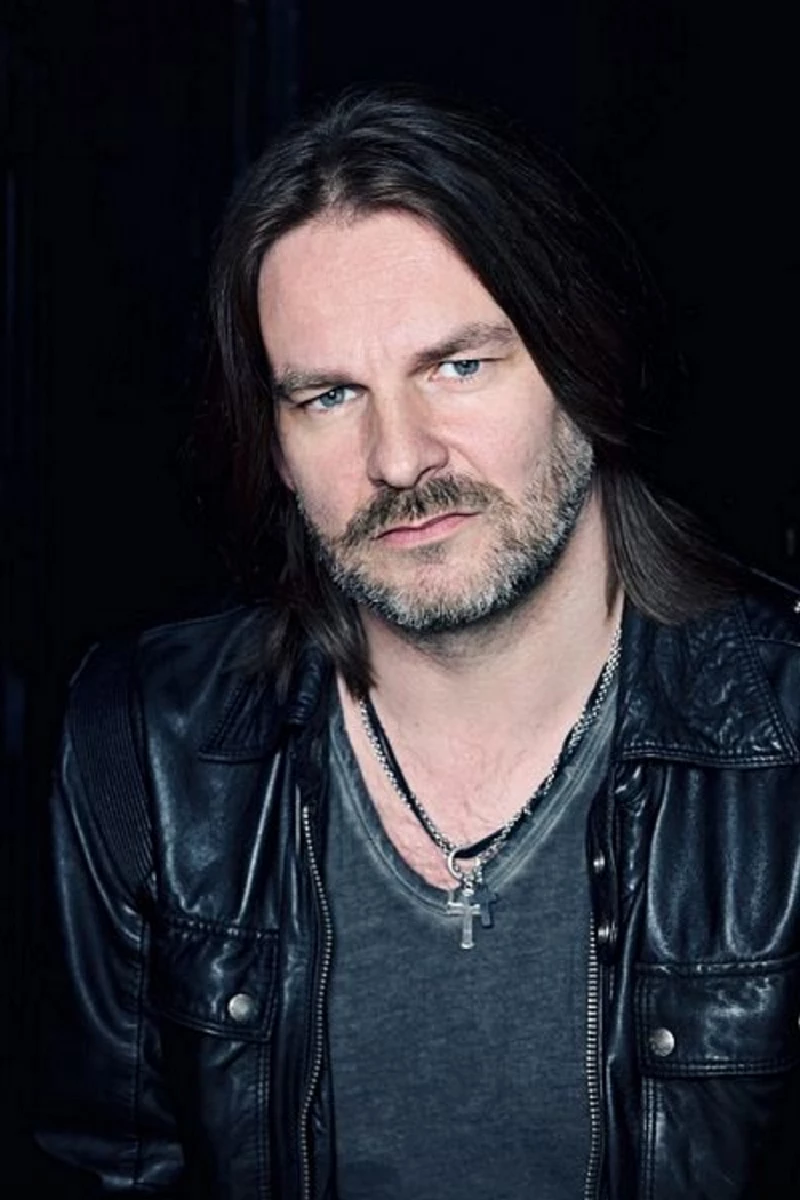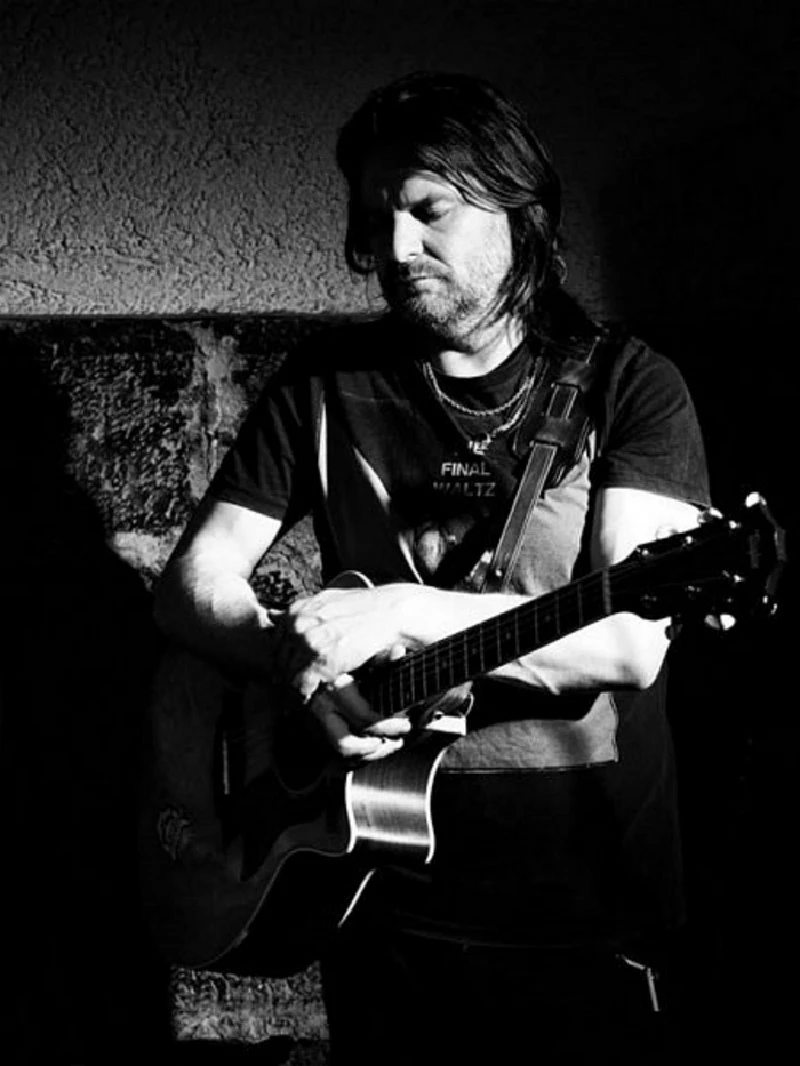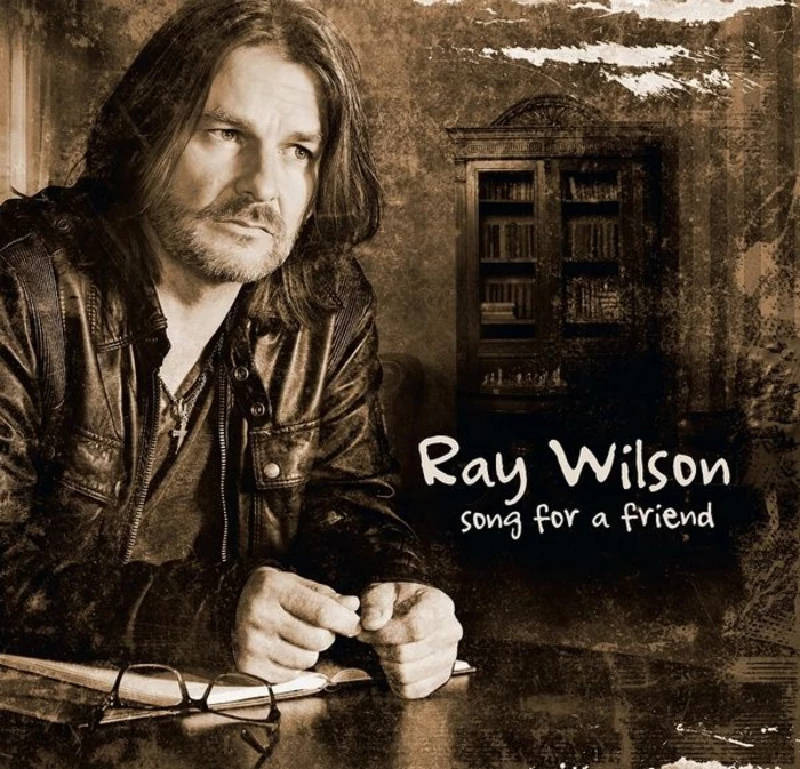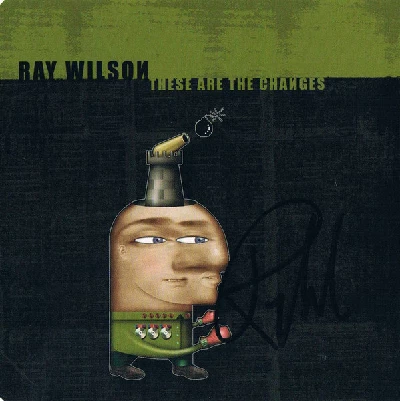Ray Wilson - Interview
by John Clarkson
published: 21 / 7 / 2016

intro
Stiltskin and former Genesis front man Ray Wilson speaks to John Clarkson about his acoustic fifth and latest solo album, 'Song For A Friend', which was partially influenced by the death of a friend
When someone dies unexpectedly it can be impossible to make anything positive out of it, but that is what the Scottish singer-songwriter Ray Wilson has attempted to do with his latest album, ‘Song For A Friend’. Ray Wilson, who is 47, first came to the fore with the rock/grunge outfit Stiltskin, who had a UK number one hit with their debut single, ‘Inside’, in 1994. He then went on to attract massive public attention when in late 1996 he was picked after a series of lengthy auditions by guitarist Mike Rutherford and keyboardist Tony Banks to become the front man in progressive rock giants Genesis, replacing Phil Collins who had decided to focus on his solo career. Wilson stayed with Genesis for two years, recording their 1997 final album-to-date, ‘Calling All Stations’ and touring the world with them before Rutherford and Banks decided to disband Genesis in 1998 when ‘Calling All Stations’ which sold well in Europe failed to take off in America. In the years since then Wilson has sporadically resurrected Stiltskin, recording another two albums with his early group, 2006’s ‘She’ and 2011’s ‘Unfulfillment’ to join their 1994 first album, ‘The Mind of an Eye’. He has also released four previous studio albums, ‘Change’ (2003), ‘The Next Best Thing’ (2004), ‘Propaganda Man’ (2008), and ‘Chasing Rainbows’ (2013) in a long and critically acclaimed solo career. ‘Song For A Friend’, which has just been released and is his fifth solo album, is dedicated to the memory of Wilson’s early mentor and friend, James Lewis, who, having been paralysed after being involved in a swimming accident, committed suicide last year. Mainly acoustic, ‘Song For A Friend’, for which Stiltskin guitarist Uwe Metzler composed the music and Wilson the lyrics, is sparse and minimal in tone, and will be followed by an “electric” album, ‘Makes Me Think of Home’, in October. The title and central track of ‘Song For A Friend’ is told from the perspective of James Lewis on the day he died in which he visited the small port town in which he was born, and, when his helper went briefly away to fetch a jumper from him, he drove his wheelchair off a harbour wall and into the sea. It has Lewis reflecting back on his poor but happy childhood and his selfless, self-sacrificing mother, while ‘How Long is Too Long’ , the track which follows it, imagines some of the other feelings Lewis had inside which led him to kill himself. ‘Old Book on the Shelf’, the first song, has a man, the only customer in an old, small bar in Amsterdam, opening up a solitary book--he discovers that it is the story of his life--and realising as he reads it that the only way he will find any peace and happiness is to start accepting himself for who is. The Dumfries-born Ray Wilson spoke to Pennyblackmusic on the phone from Poznan in west-central Poland where he is based about ‘Song For A Friend’, which he has described as “a collection of musical short stories.” PB: Your original intention was to release a double album, ’Backstreet Drivers’, one album of which consisted of acoustic material and one album of which consisted of electric material. Why have you decided to release two separate albums instead? RW: When I finished ‘Song For a Friend’, I was concerned that it might be overshadowed. The production is minimalist and it is a very personal album. I wanted to release it on its own, so that people could focus on what it is about, which is largely the narrative of the songs. The other album, the electric one, will be released later as a separate package called ‘Makes Me Think of Home’. It was a last minute decision to do this. PB: The title track, ‘Song For A Friend’, and the song which follows it, ‘How Long is Too Long’, tell of your close friend’ James Lewis’ suicide. Was he another singer-songwriter? RW: No, not at all. I lived in Edinburgh from the age of eighteen until the age of thirty-eight. When I first arrived in Edinburgh, I took my first steps in trying to become a professional musician. I didn’t necessarily pick the correct city for that, but that was my decision at the time and I was looking for somewhere to live and I met James. He offered me a room in his apartment. He was always a good friend. He looked after me a bit, helped me with money when I didn’t have any, and when I became commercially successful with Stiltskin and again soon afterwards with Genesis there was a genuine happiness that I had done well. He was inspirational to me as a person. He was a very positive person, very upbeat and likeable, an affable character, but unfortunately about three years ago he had a tragic accident when he was on holiday in Spain. He was on a trampoline jumping into a swimming pool and landed on his neck and broke it. He was left completely paralysed and soon after he died. He actually died when I was writing this album. I was in the middle of writing it and I couldn’t go to his funeral because I was touring, but when I got back home to Poznan I felt a strong need to write a song for him. I wrote ‘How Long is Too Long’ first of all, but I didn’t really feel that it said all that I wanted it to say in its entirety, so a little while later I wrote ‘Song For A Friend’ as well, which I felt had a more literal lyric. It was more in line with what I wanted to say. Eventually I decided to dedicate the album to him. I thought that it would be a nice thing to do for someone who was very good to me. PB: It must have been a tough thing to do emotionally, to write two songs like that and then to release them. Was there ever a point in which you felt that this might be too difficult to write or to put them out? RW: I thought about it, not so much from my point of view, but from his relatives’ point of view. I didn’t want either of these songs in any way to appear insensitive. From that point of view I thought about it a lot. When I recorded them, it was a very emotional experience and again when I performed them live for the first time it was a strange experience, almost overwhelming really. Looking back at it now though, I think that it is a nice thing to do, to remember someone’s life with a song. Whether you think they are good songs or bad songs, it doesn’t really matter. They will last forever and keep James’ memory living on. PB: Was the main reason for writing these songs to simply try and understand why James died? RW: I don’t think that I was so much trying to understand why he died as I just felt compelled to do it. The reason why I am on this Earth in my opinion is because I sing and I write songs. That is what I do. That is what I have always done, and I feel very lucky that I can do that and I have made a living out of it, so when something affects me in my life, whether it be in this case with what happened with James or whether it is with other issues in my life, I feel compelled to write about it. It is also true to say that the people who follow me as an artist very much relate to the honesty in these types of songs. They react to it at a human level. I tried with ‘Song For A Friend’ in particular but as I do with all the songs that I write, I try to put a positive message at the end of it. At the end of it I refer to the fact that he is at peace. In my view there is no greater achievement in life and perhaps in death as well – I don’t know – to be at peace. I like to think of James being at peace, and that for me is a comforting way to think about him. PB: ‘Old Book on the Shelf’ is more metaphorical. Why did you set it in Amsterdam? RW: It is a true story or at least it is a parallel to a true story. As you say, it is a metaphor. In my mind when I was writing this song I saw myself as a person sitting in the corner of an old bar reading a book. That was the vision I had in my head. Amsterdam seemed quite fitting because of that city’s spirit. I have been there many times so I know its atmosphere. In the lyric I refer to Anne Frank. I have been to where her house is. I have done the canal trip where they go, “And on your left you will see the house of Anne Frank” (Laughs). I set the story and the bar near that. It could have been anywhere though. It could have been Old Berlin. It could have been Lisbon. It could have been Edinburgh for that matter, but on this occasion the vision I had was Amsterdam. PB: Was it inspired by your own or someone else’s experiences? RW: It was inspired by my own. When I was thirty years old, I read the book, ‘The Alchemist’ by Paulo Coelho. I had had most of my commercial success with Stiltskin and Genesis by that stage, but by then it had largely stopped and I was re-evaluating my life and thinking, “Okay, do I want to get back into this commercial road and follow that path?”, the same path that I had been following during my twenties. I found myself really questioning my life, and for a couple of years I didn’t do anything really. I did one concert with the Scorpions and the Berlin Philharmonic Orchestra and that was it, which for me is very unusual. At that time I was reading a lot, and I read ‘The Alchemist’ and I found it really enlightening. It gave me a new perspective on life and how to look upon it, and I think at that point I started to change my mental direction and to live a more peaceful, fulfilling life. I also made a decision to take control of my life which I have been doing since then as an artist and in everything that I do. I try and keep as much control of my own situation and destiny as I possibly can. For me that is very important. ‘Old Book on the Shelf’ is a metaphor for that. PB: It can’t be easy for you doing that, especially as you spend so much time touring, RW: Yes (Laughs). It is quite strange. All through my twenties I hated touring, and even into my early thirties I just wanted to go home. I was never comfortable travelling and being away, and now the opposite is true. I don’t know why that has happened. Maybe it is just age or just repeating the same thing over and over again. I have become very accustomed to the reality of having an audience in front of me and I enjoy being able to touch people emotionally. There is something very magical about that whole experience. PB: You’re spending much of the rest of the year touring in Germany. You seem to be especially popular there. Why do you think you go down so well with German audiences? RW: I have never really fully understood why (Laughs), but they have a very good touring circuit for small and middle-sized artists there. Both Genesis and Stiltskin were very popular in Germany. They were in the UK, of course, as well, but when I started my solo career there just seemed to be so many more opportunities to go and play in Germany in comparison to the UK where there were a lot less. Subsequently I ended up playing, if you like, to my strengths, and I went where the opportunities were. That is going back almost twenty years now, so I have built up a fairly strong following in a very traditional manner of sitting in front of people and doing gigs time after time for years. I have built up a very strong audience in Germany now. PB: Final question. The second album ‘Makes Me Think of Home’ will be out in October. You were brought up in Dumfries, spent twenty years in Edinburgh and then the last eight years living in Poland. You also spend a lot of time touring and have said elsewhere that you travel between 70,000 and 80,000 kilometres each year. Where do you see as home? RW: I think it is on my bus and doing shows. That is what I see as my home really. I have many homes. That is perhaps a better way of putting it, but, if I look at where I feel most happy I am at my happiest when I am working and performing. I love coming back to Poznan where I now live. I have a girl here and I love her and I am happy to be here. Home is where the heart is if you like, but for me I think that home is on the road. It is something of a cliché but it is true. Perhaps when I am retired I will go to Dumfries again. I started there and I will probably finish my life there. That is probably how it will be. PB: Thank you.
Band Links:-
http://www.raywilson.co.ukhttps://www.facebook.com/raywilsonofficial
https://twitter.com/RayWilson_20
Picture Gallery:-


reviews |
|
These Are The Changes (2004) |

|
| Passionate new single from former Stiltskin and Genesis frontman Ray Wilson, which pours scorn on America's War on Terror |
most viewed articles
current edition
John McKay - InterviewCathode Ray - Interview
Robert Forster - Interview
When Rivers Meet - Waterfront, Norwich, 29/5/2025
Spear Of Destiny - Interview
Fiona Hutchings - Interview
Carl Ewens - David Bowie 1964 to 1982 On Track: Every Album, Every Song
Chris Wade - Interview
Shrag - Huw Stephens Session 08.12.10 and Marc Riley Session 21.03.12
Brian Wilson - Ten Songs That Made Me Love...
previous editions
Heavenly - P.U.N.K. Girl EPBoomtown Rats - Ten Songs That Made Me Love....
Manic Street Preachers - (Gig of a Lifetime) Millennium Stadium, Cardiff, December 1999
Allan Clarke - Interview
Oasis - Oasis, Earl's Court, London, 1995
Barrie Barlow - Interview
Beautiful South - Ten Songs That Made Me Love...
Pixies - Ten Songs That Made Me Love...
Chuck Prophet - Ten Songs That Made Me Love...
Dwina Gibb - Interview
most viewed reviews
current edition
Peter Doolan - I Am a Tree Rooted to the Spot and a Snake Moves Around Me,in a CircleVinny Peculiar - Things Too Long Left Unsaid
Garbage - Let All That We Imagine Be The Light
Vultures - Liz Kershaw Session 16.06.88
John McKay - Sixes and #Sevens
Little Simz - Lotus
HAIM - I Quit
Pulp - More
Lapsley - I'm a Hurricane, I'm a Woman In Love
Billy Nomates - Metalhorse
Pennyblackmusic Regular Contributors
Adrian Janes
Amanda J. Window
Andrew Twambley
Anthony Dhanendran
Benjamin Howarth
Cila Warncke
Daniel Cressey
Darren Aston
Dastardly
Dave Goodwin
Denzil Watson
Dominic B. Simpson
Eoghan Lyng
Fiona Hutchings
Harry Sherriff
Helen Tipping
Jamie Rowland
John Clarkson
Julie Cruickshank
Kimberly Bright
Lisa Torem
Maarten Schiethart